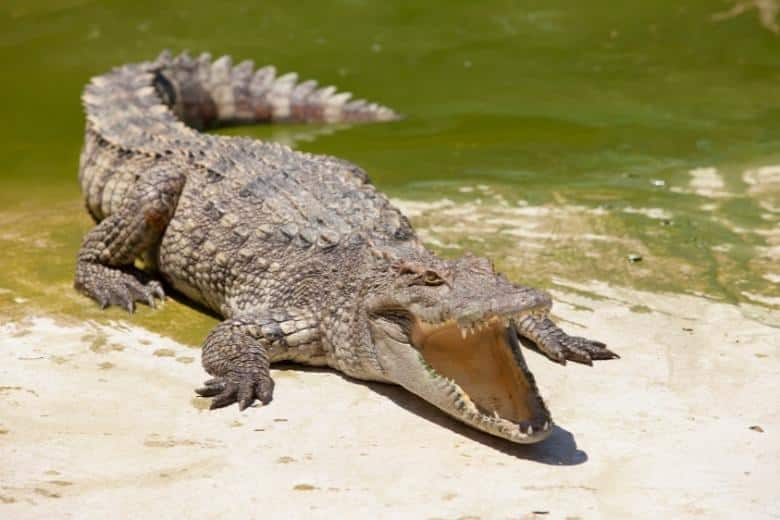Alligators are known for their sharp teeth, powerful jaws, and fierce demeanor. They are apex predators in their ecosystem, meaning that they are at the top of the food chain. However, even these formidable creatures are not completely immune to being preyed upon. In fact, there are several predators that pose a threat to alligators, from larger predators to smaller opportunistic creatures.
Alligator Diet and Habitat
Before diving into the predators of alligators, it is important to understand their diet and habitat. Alligators are carnivorous reptiles that primarily feed on fish, turtles, birds, and mammals. They live in freshwater habitats, such as rivers, lakes, and swamps, and can also be found in saltwater marshes and coastal areas. Alligators are well adapted to their environment and are excellent hunters, which makes them difficult prey for other animals.
Large Predators that Eat Alligators
Despite their intimidating appearance, alligators are not invincible and can be hunted by larger predators. One of the most significant predators of alligators is the American crocodile, which is found in the same habitat as alligators. Crocodiles are larger than alligators and have more robust skull and jaw muscles. They are also more aggressive and will not hesitate to attack an alligator if they are hungry or feel threatened.
Another large predator that eats alligators is the Florida panther. These large cats are carnivores and will hunt alligators if their usual prey is scarce. Although rare, there have been instances of panthers attacking and killing alligators, demonstrating their strength and adaptability as predators.
Smaller Predators that Eat Alligators
While larger predators are capable of taking down alligators, smaller predators can also pose a threat. One example is the Eastern diamondback rattlesnake, which is found in the same habitat as alligators. These snakes are venomous and can kill an alligator with a single bite if they strike in the right spot.
Another smaller predator that eats alligators is the Florida softshell turtle. These turtles have soft, leathery shell that allows them to move quickly and catch prey. They are opportunistic predators and will feed on alligator hatchlings and smaller individuals.
Opportunistic Predators
In addition to specific predators, there are also opportunistic predators that will take advantage of any chance to catch an alligator. For example, large birds such as eagles and ospreys have been known to swoop down and grab small alligators if they are near the water’s surface. Other opportunistic predators include otters, raccoons, and even humans.
Alligator Hunting Tactics
Despite their formidable appearance, alligators are not invincible and can be hunted. Predators such as crocodiles and panthers will use their strength and speed to take down an alligator, while smaller predators such as rattlesnakes and softshell turtles will rely on their venom or agility. Opport
Alligators, on the other hand, have their own hunting tactics to catch prey. One of their most notable tactics is the “death roll.” When an alligator catches its prey, it will spin and roll in the water to tear off pieces of flesh. This technique is particularly effective against larger prey, as it allows the alligator to tear off chunks of meat without having to exert too much energy.
Alligators also have powerful jaws that can crush bones and tear through flesh, making them one of the most efficient hunters in their ecosystem. Their ability to stay hidden in the water, combined with their quickness and agility, allows them to ambush and catch their prey with ease.
Defense Mechanisms of Alligators
While alligators are skilled hunters, they also have a few defense mechanisms to protect themselves from predators. One of their main defenses is their tough, scaly skin, which is difficult for most predators to penetrate. Additionally, alligators have sharp claws and teeth that they can use to fight off attackers if necessary.
Alligators are also excellent swimmers and can escape from predators by diving deep into the water and holding their breath for an extended period of time. This technique allows them to evade predators and stay hidden until the threat has passed.
Conservation Efforts for Alligators
Alligators were once endangered due to hunting and habitat loss, but thanks to conservation efforts, their populations have rebounded. The alligator is now classified as a species of “least concern” by the International Union for Conservation of Nature (IUCN).
Conservation efforts for alligators have included habitat restoration, restrictions on hunting, and public education programs. By raising awareness about the importance of alligators and their role in their ecosystem, conservationists hope to ensure their continued survival.
Alligator and Predator Coexistence
While predators and alligators may seem like enemies, they are an essential part of their ecosystem and must coexist. Alligators play a vital role in regulating the populations of their prey, and their presence helps maintain the balance of the ecosystem.
Predators, on the other hand, help keep alligator populations in check and prevent them from becoming overpopulated. By controlling the number of alligators in the ecosystem, predators help ensure that the alligator’s habitat remains healthy and balanced.
Faqs
Are alligators at risk of being hunted by humans?
While alligators were once hunted for their skins and meat, hunting is now heavily regulated and restricted in most areas to protect the species.
What is the most significant predator of alligators?
The American crocodile is one of the most significant predators of alligators, as they are found in the same habitat and have a more robust skull and jaw muscles.
Can alligators defend themselves against larger predators?
Alligators have several defense mechanisms, such as their tough skin and sharp claws, which they can use to defend themselves against larger predators.
Are alligator populations healthy?
Alligator populations have rebounded in recent years due to conservation efforts, and they are now classified as a species of “least concern” by the IUCN.
What is the importance of predators in the ecosystem?
Predators play a vital role in regulating populations and maintaining the balance of the ecosystem. By controlling the number of prey species, predators help ensure the health and stability of the ecosystem.
Conclusion
Alligators are apex predators in their ecosystem, but they are not immune to being preyed upon by larger or smaller predators. While alligators have formidable hunting tactics and defense mechanisms, they still face threats from other animals. By understanding the predators of alligators and their behavior, we can better appreciate the importance of alligators and their role in the ecosystem.

